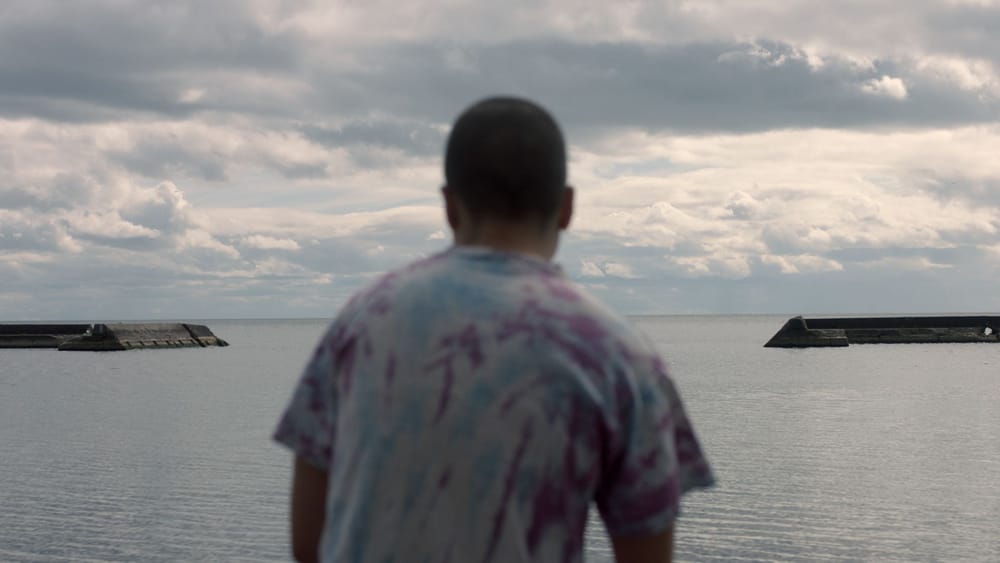There’s something quietly powerful about a film that doesn’t promise an easy journey but still holds space for hope. Really Happy Someday, J Stevens’ heartfelt debut, carries a title that feels like a gentle whisper—a reminder that even when life feels heavy and uncertain, happiness is not only possible but waiting just beyond the horizon. For anyone caught between who they were and who they’re becoming, this story feels deeply familiar.
The film follows Z, a trans man stepping into a new chapter of his life and identity. Before starting testosterone, Z was known for his unforgettable Eponine in Les Misérables, a role that held meaning far beyond the stage. When he falters at an audition singing that same song, it’s more than a missed opportunity—it’s a painful confrontation with how much has changed, and how much feels lost. His voice, once so steady and sure, now feels foreign, and with it, the foundation of his dreams begins to shake.
Watching Z navigate this delicate terrain is something many can relate to, whether trans or not. We all know what it’s like to face a version of ourselves that doesn’t quite fit the world we expected, to grieve the loss of something familiar even while reaching for a future that promises more. His story doesn’t shy away from the discomfort of change. Instead, it shows us that growth is rarely neat or linear. It’s messy, awkward, and sometimes painfully slow — but it’s where the most profound beauty lives.
One of the film’s most touching elements is the way it portrays support and connection in the midst of uncertainty. Z’s agent urges him to pivot away from musical theatre entirely, while his girlfriend encourages him to hold on—though her dreams seem tied to her own hopes of moving to New York. These relationships are complicated and real, full of the push and pull many of us experience when we’re trying to find our footing in a shifting world.
It’s behind the bar where Z finds something grounding. His friendship with Santi—a fellow trans man who’s been on testosterone for years—brings mentorship, encouragement, and a spark of flirtation that feels hopeful and sweet. Santi’s belief in Z’s voice, even as it changes, reminds us all that transformation isn’t about losing ourselves but about discovering new parts of who we can be.
The musical lessons Z takes are beautifully rendered moments of vulnerability and rediscovery. His teacher’s gentle encouragement to embrace the new qualities of his voice speaks to a larger truth: transition isn’t about erasing the past or pretending nothing has shifted. It’s about learning to love yourself in all your evolving complexity. That’s a lesson that resonates far beyond gender identity.
There’s a common narrative that transitioning should be a purely positive journey—a triumph over adversity — but Really Happy Someday refuses to oversimplify. It acknowledges that transition can bring its own internal challenges, not just external ones. When everything about your body and self-expression feels in flux, it’s natural to grieve what you’ve left behind even while celebrating the new. And the film handles that tension with grace and honesty.
What struck me most is how Z’s vocal change becomes a beautiful metaphor for the whole experience of becoming. His voice isn’t just different—it’s unfamiliar, sometimes uncomfortable, but it’s undeniably his. This reminds us identity isn’t fixed or static. We are always growing, shifting, unfolding—sometimes in surprising ways. And that’s more than okay—it’s life.
The performances feel intimate and deeply personal, especially from Breton Lalama as Z. His portrayal feels like a breath of fresh air, grounding the film in raw truth and emotional nuance. You can feel the weight of the journey in his expressions, the quiet strength in his hesitations, and the hopeful spark when he dares to dream again.
The supporting cast brings depth and warmth, particularly Xavier Lopez as Santi. Their connection is both tender and electric, capturing the hope and uncertainty of new beginnings. It’s a beautiful reminder that community can offer profound healing. This story goes beyond the initial stages of transition, thoughtfully portraying the continuing journey of shaping a life after that first bold step.
Another beautiful aspect is the soundtrack, featuring trans artists with diverse voices. It’s a subtle but meaningful reminder that being trans is not about limits or loss, but expanding who you are. The music feels like an anthem for self-discovery and resilience, weaving through the story with emotional depth.
In many ways, Z’s journey as an actor mirrors his transition—both require courage, vulnerability, and a willingness to face the unknown. Acting, like life, asks us to take risks, to trust that even when moments feel hard, something worth chasing is on the other side. The film captures this beautifully, offering quiet encouragement to anyone wrestling with their identity or dreams.
Really Happy Someday doesn’t offer quick happiness or simple solutions. Instead, it asks us to accept both struggles and victories, to recognize that growing isn’t always easy, and to keep believing that happiness can come, even if it feels far away. For anyone feeling stuck or unsure about being themselves, this film gently reminds us: you might not feel truly happy right now—but one day, you will.
Director: J Stevens
Cast: Breton Lalama, Khadijah Roberts-Abdullah, Xavier Lopez
Writers: J Stevens, Breton Lalama
Producer: J Stevens

